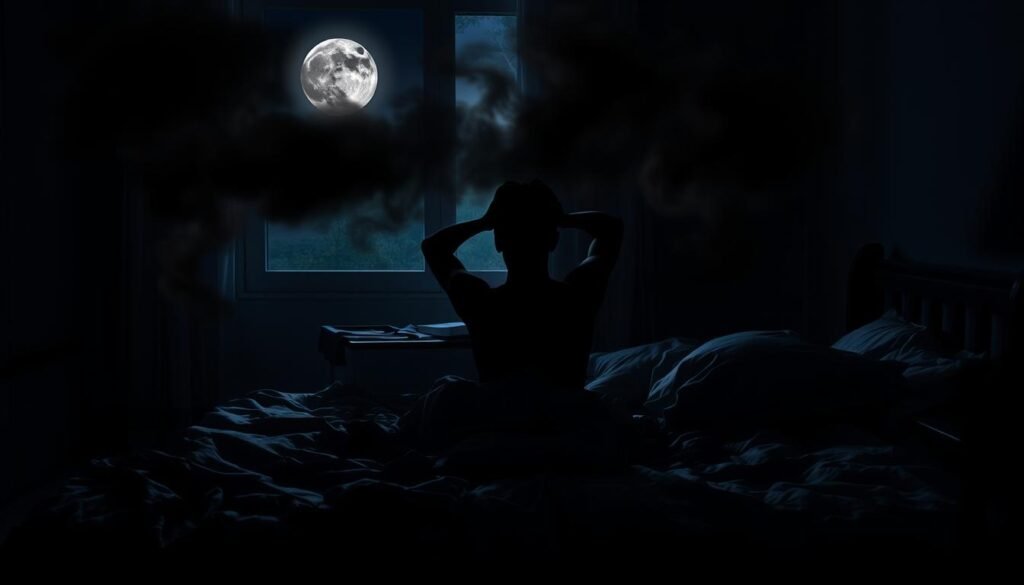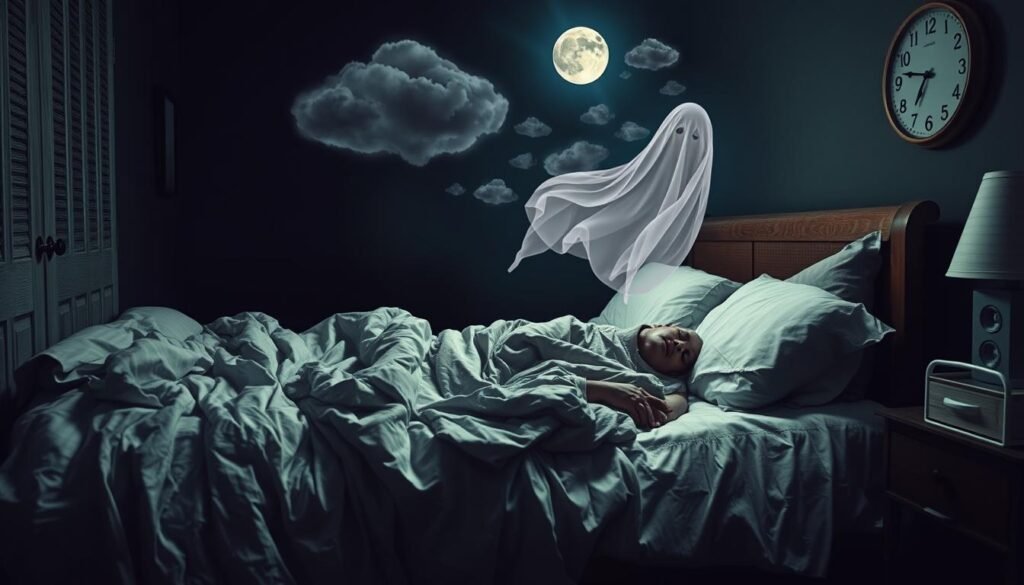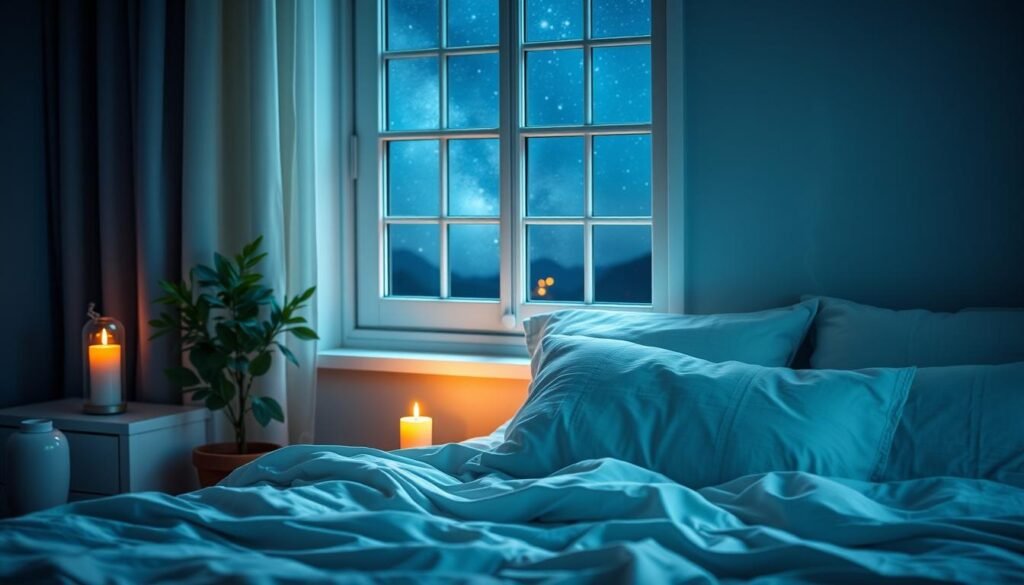Almost 30% of adults will face anxiety disorders during their life. This high number shows a big problem linked with sleep issues. People often wake up feeling anxious in the night. Anxiety disorders and sleep problems are closely connected, creating a tough cycle. Anxiety can make sleep issues worse, which then harms mental health.
Since anxiety and sleep problems affect each other, finding ways to cope is important. Understanding why you feel anxious at night can help a lot. Better sleep can reduce anxiety and boost mental health. So, tackling these issues early is key. For tips, visit anxiety and sleep disruption and learn about managing stress.
Key Takeaways
- Approximately 30% of adults will experience anxiety disorders during their lifetime.
- A significant portion of those with anxiety face nighttime distress and insomnia.
- Effective strategies, such as mindfulness and therapy, can alleviate nighttime anxiety.
- Improved sleep can lead to a reduction in anxiety symptoms and better mental health.
- Understanding the relationship between sleep and anxiety is essential for recovery.
- Professional help is crucial for managing severe anxiety disorders.
- At-home strategies can help ease anxiety symptoms for many individuals.
Understanding Sleep Anxiety
Sleep anxiety is when you’re scared or worried about sleeping well. It’s often linked to other mental health issues, making sleep problems worse. Learning about anxiety helps us understand its effect on sleep. Insomnia is a big problem for many. To tackle sleep anxiety, improving sleep habits and possibly getting therapy or medication is key.
Definition and Overview
Developing sleep anxiety comes from different causes, like stress or big changes in life. Pressure from work or troubles in relationships add up, affecting your mind. This can lead to worrying about not sleeping well. People look for reasons behind their anxiety to find some relief. Knowing about what triggers your stress and how your body reacts is the first step in handling sleep problems.
How Sleep Anxiety Develops
Stress from life can hurt your sleep. If you’re already prone to anxiety, stress makes it hard to sleep well at night. Conditions like generalized anxiety disorder and PTSD make sleeping well even tougher. Lack of sleep raises norepinephrine, making it harder to calm down and sleep again if you wake up anxious.
Nocturnal panic attacks spike your heart rate and fill you with fear, ruining your sleep. This can start a cycle where stress makes it hard to sleep, and that lack of sleep makes you more anxious. Studies show that anxiety messes with REM sleep, which is important for processing emotions. This makes it hard to cope during the day.
There are ways to fight this. Redirecting your anxious thoughts, exercising, mindfulness, and seeking professional help can lessen anxiety and improve sleep. Making your sleeping area better, having a bedtime routine without screens, and relaxing activities also help you sleep better.
Causes of Waking Up With Anxiety in the Middle of the Night
Waking up feeling anxious in the night can be really tough. It’s important to know why it happens to fix it. Stress and mental health issues can make anxiety spike, ruining a good night’s sleep.
Everyday Stressors and Their Impact
Things like work, family, and money worries can stress you out. This stress doesn’t just go away at night. It can wake you up, feeling anxious. Money troubles especially can make anxiety worse. Also, our bodies make more cortisol in the morning. This might make you feel more anxious when you wake up.
The Role of Mental Health Disorders
Disorders like generalized anxiety or bipolar disorder can mess with your sleep. Those with these issues often can’t stop worrying, even at night. About 30% of adults will face an anxiety disorder at some point. That’s why it’s crucial to get the right treatment. This might mean therapy or medication to get better sleep and feel less anxious.

The Connection Between Anxiety and Sleep Disruption
Recent research has focused on how anxiety and sleep problems are connected. Anxiety can mess with how well we sleep. It can cause thoughts to race and muscles to tense up. People with anxiety often struggle to relax. This makes it hard for them to fall asleep or stay asleep. They end up tired and worn out during the day. Studies have shown that this issue goes both ways. Bad sleep can make anxiety worse. This creates a tough cycle that harms emotional health.
How Anxiety Affects Sleep Quality
Anxiety has a big impact on sleep. It triggers the body’s stress response, making it harder to sleep. This can lead to insomnia. Research has found that certain anxiety disorders change sleep patterns. This includes generalized anxiety disorder and panic disorder.
Those dealing with anxiety might:
- Have trouble falling asleep
- Wake up a lot at night
- Spend more time awake in bed
- Get less deep sleep
All these issues can make sleep quality worse. This, in turn, can increase anxiety.
The Vicious Cycle of Anxiety and Insomnia
The cycle of insomnia and anxiety makes each other worse. Worrying about not sleeping can lead to panic at night. This brings fear and a feeling of being out of control. People start to fear bedtime, worried they won’t sleep. This makes their anxiety even higher. Also, a study found that 8% of participants had clinical insomnia.
Treating both anxiety and sleep issues is key. Cognitive Behavioral Therapy (CBT) is effective in this area. CBT focuses on healthy sleep habits, like keeping a regular wake-up time. This can help break the cycle of anxiety and insomnia.

For more details on the link between anxiety and sleep problems, check out this useful article.
Coping Strategies and Stress Management Techniques
Dealing with anxiety and sleep troubles needs practical steps that bring peace. Using mindfulness and being active can help a lot. Here are some good ways to fight anxiety and sleep better.
Mindfulness and Relaxation Techniques
Mindfulness is key for tackling anxiety. Meditation, yoga, and progressive muscle relaxation all help you relax. This fights stress that keeps you from sleeping well. Just 20 to 25 minutes a day can make stress easier to handle. Stress makes cortisol go up, which messes with your sleep. Relaxation methods can lower cortisol, making it easier to sleep.
- Try guided meditation or breathing exercises before bedtime.
- Incorporate gentle yoga or tai chi into your evening routine.
- Establish a relaxing pre-sleep ritual to signal the body that it’s time to wind down.
Physical Activity and Its Benefits
Staying active is great for lessening anxiety and sleeping better. Just 30 minutes of things like walking or swimming each day boosts relaxation and happiness. But don’t exercise too hard right before bed as it can keep you awake.
- Schedule daily walks in nature to enhance mood and alleviate anxiety.
- Consider resistance training for comprehensive health benefits.
- Aim to integrate calm, restorative activities in the evening to encourage restful sleep.

Exploring Cognitive Behavioral Therapy for Anxiety
Cognitive Behavioral Therapy helps manage anxiety by focusing on thoughts and behaviors. Known as CBT for anxiety, it changes negative patterns affecting sleep. This is crucial for those wanting better sleep quality.
What is Cognitive Behavioral Therapy (CBT)?
CBT is a type of therapy that links our thoughts, feelings, and actions. It teaches people to recognize and change unhelpful thinking. By learning these skills, individuals can better handle their anxiety and improve their sleep.
How CBT Can Improve Sleep
CBT for anxiety can make sleep better. Techniques like sleep restriction help. They reduce time in bed and ease sleep worries. Using CBT-I techniques leads to better sleep quickly.
CBT-I specifically tackles insomnia. It’s shown to be highly effective. It combines mindfulness and practical strategies, offering hope for those struggling with sleep anxiety.
Improving sleep also means changing bad habits. Limiting screen time before bed helps. Establishing a regular sleep schedule is key. Combined with CBT, these changes can boost sleep and reduce anxiety.
Recognizing Nocturnal Panic Attacks
Waking up in the middle of the night feeling intense fear is distressing. This is often due to nocturnal panic attacks. Knowing the signs is key for those seeking help. Even though these attacks happen without warning, learning to recognize them can ease anxiety and improve sleep.
Symptoms and Signs
Common panic attack signs at night include:
- Heart palpitations or racing heart rate
- Shortness of breath
- Trembling or shaking
- Profuse sweating
- Feelings of unreality or detachment
- A sense of impending doom
These symptoms can wake someone from sleep, leaving them confused. After an attack, it might be hard to fall back asleep. You might also fear more attacks happening and feel tired during the day. Catching these signs early is important in getting help for panic attacks before they get worse.
When to Seek Help for Panic Attacks
Knowing when to get professional help is crucial. You should seek help if you notice:
- Regular nocturnal panic attacks
- Avoiding sleep from fear of panic
- Day-to-day life being heavily disrupted by attacks
- More than two panic attacks in a month
Getting help from mental health experts can give you support and treatment choices. They help with both the body and mind aspects of these attacks. With the right care, you can reduce these episodes and lead a better life.
Practical Tips to Reduce Nighttime Anxiety
Making a calming bedtime ritual is key to decreasing nighttime anxiety. It helps you sleep well and feel refreshed. Simple activities before bed make your mind and body ready for sleep. Here, we share ways to make a calming bedtime routine and good sleep habits for better sleep quality.
Establishing a Calming Bedtime Routine
A calming routine before bed greatly helps you relax. Some activities to try include:
- Reading a captivating book to shift focus from stress
- Listening to soothing music to make a peaceful setting
- Practicing the 4-7-8 breathing technique, which Dr. Andrew Weil suggests, to relax your breathing and reduce tension
- Enjoying a cup of chamomile tea to ease anxiety and help you sleep
Having a bedtime routine gets your body used to sleeping at the same time. Sticking to it makes your body know when it’s time to rest, leading to better sleep.
Sleep Hygiene Practices
Taking care of your sleep hygiene improves sleep quality. Things to do include:
- Keeping a regular sleep schedule, even on weekends
- Staying away from screens before bed to avoid blue light
- Making sure your sleeping space is quiet and comfy
- Exercising during the day to lower stress levels
Also, drink less caffeine in the afternoon and evening. This prevents anxiety and helps you sleep peacefully. Trying quiet activities like yoga before bed can also help you unwind.
The Importance of Professional Help
It’s vital to seek help if you’re dealing with anxiety or sleep issues. Anxiety can weaken your coping ability. This can greatly disturb your day-to-day life. Signs it’s time to see a healthcare provider include overwhelming anxiety, coping methods that don’t work, or disruptions to your normal life.
When to Consult a Healthcare Provider
Seeing a healthcare expert is key to managing anxiety. You should seek help if you:
- Often feel so anxious that it stops you from living your life normally.
- Have physical signs like a fast heart rate or trouble sleeping.
- Don’t enjoy activities you used to love.
- Find it hard to deal with everyday stress, including changes at home or work.
Treatment Options for Anxiety Disorders
Treatment for anxiety disorders varies. Your healthcare provider might suggest:
| Treatment Type | Description |
|---|---|
| Cognitive Behavioral Therapy (CBT) | This therapy helps you understand and change how you think. |
| Medications | This includes different medicines like SSRIs and benzodiazepines to help with symptoms. |
| Support Groups | These groups offer a chance to share experiences and coping tips. |
| Herbal Remedies | Natural supplements may help but talk to your healthcare provider first. |
Getting professional help can lead to a treatment plan that works for you. People with anxiety should remember they’re not alone. There’s a lot of support out there.
Conclusion
Waking up anxious in the night is common for many people. It happens due to different reasons, such as stress or health issues. Knowing why it happens is key to beat anxiety and get good sleep again.
Practicing mindfulness and having a relaxing bedtime routine helps a lot. Adding exercise to your day can also make you feel better. Using relaxation methods and watching what you eat helps improve sleep too.
For serious anxiety, getting help from a professional may be needed. Treatments like Cognitive Behavioral Therapy and medicine can help manage anxiety well.
Restful sleep is within reach. By tackling anxiety with the right methods, you can find balance and enjoy good sleep again. To learn more, check out the advice and help offered at this site.